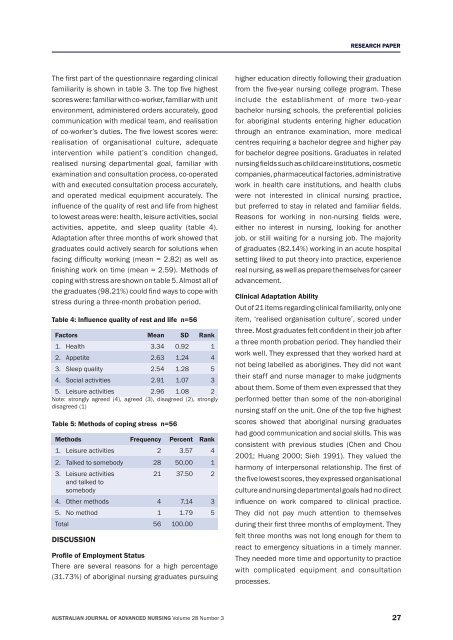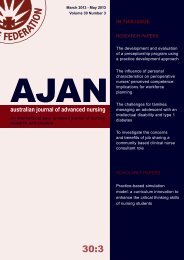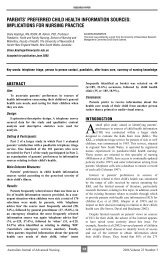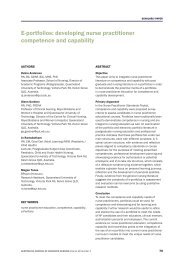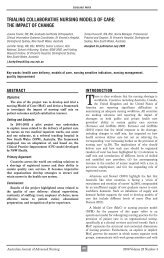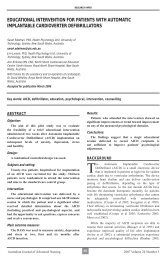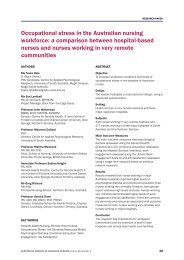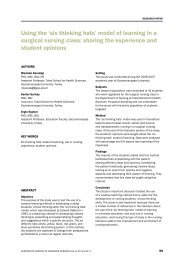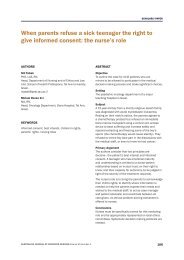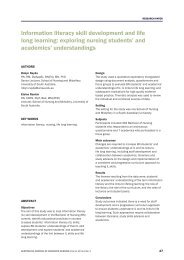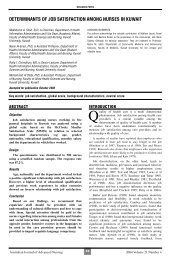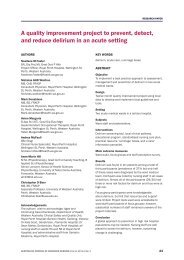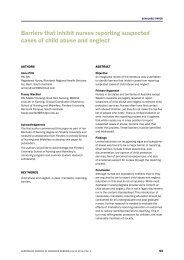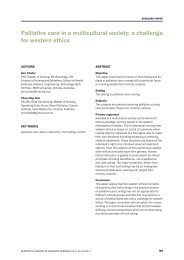australian journal of advanced nursing
australian journal of advanced nursing
australian journal of advanced nursing
Create successful ePaper yourself
Turn your PDF publications into a flip-book with our unique Google optimized e-Paper software.
The first part <strong>of</strong> the questionnaire regarding clinical<br />
familiarity is shown in table 3. The top five highest<br />
scores were: familiar with co‑worker, familiar with unit<br />
environment, administered orders accurately, good<br />
communication with medical team, and realisation<br />
<strong>of</strong> co‑worker’s duties. The five lowest scores were:<br />
realisation <strong>of</strong> organisational culture, adequate<br />
intervention while patient’s condition changed,<br />
realised <strong>nursing</strong> departmental goal, familiar with<br />
examination and consultation process, co‑operated<br />
with and executed consultation process accurately,<br />
and operated medical equipment accurately. The<br />
influence <strong>of</strong> the quality <strong>of</strong> rest and life from highest<br />
to lowest areas were: health, leisure activities, social<br />
activities, appetite, and sleep quality (table 4).<br />
Adaptation after three months <strong>of</strong> work showed that<br />
graduates could actively search for solutions when<br />
facing difficulty working (mean = 2.82) as well as<br />
finishing work on time (mean = 2.59). Methods <strong>of</strong><br />
coping with stress are shown on table 5. Almost all <strong>of</strong><br />
the graduates (98.21%) could find ways to cope with<br />
stress during a three‑month probation period.<br />
Table 4: Influence quality <strong>of</strong> rest and life n=56<br />
Factors Mean SD Rank<br />
1. Health<br />
3.34 0.92 1<br />
2. Appetite<br />
2.63 1.24 4<br />
3. Sleep quality<br />
2.54 1.28 5<br />
4. Social activities<br />
2.91 1.07 3<br />
5. Leisure activities<br />
2.96 1.08 2<br />
Note: strongly agreed (4), agreed (3), disagreed (2), strongly<br />
disagreed (1)<br />
Table 5: Methods <strong>of</strong> coping stress n=56<br />
Methods Frequency Percent Rank<br />
1. Leisure activities<br />
2 3.57 4<br />
2. Talked to somebody 28 50.00 1<br />
3. Leisure activities<br />
and talked to<br />
somebody<br />
21 37.50 2<br />
4. Other methods<br />
4 7.14 3<br />
5. No method<br />
1 1.79 5<br />
Total 56 100.00<br />
DISCUSSION<br />
Pr<strong>of</strong>ile <strong>of</strong> Employment Status<br />
There are several reasons for a high percentage<br />
(31.73%) <strong>of</strong> aboriginal <strong>nursing</strong> graduates pursuing<br />
RESEARCH PAPER<br />
higher education directly following their graduation<br />
from the five‑year <strong>nursing</strong> college program. These<br />
include the establishment <strong>of</strong> more two‑year<br />
bachelor <strong>nursing</strong> schools, the preferential policies<br />
for aboriginal students entering higher education<br />
through an entrance examination, more medical<br />
centres requiring a bachelor degree and higher pay<br />
for bachelor degree positions. Graduates in related<br />
<strong>nursing</strong> fields suchaschildcareinstitutions, cosmetic<br />
companies, pharmaceutical factories, administrative<br />
work in health care institutions, and health clubs<br />
were not interested in clinical <strong>nursing</strong> practice,<br />
but preferred to stay in related and familiar fields.<br />
Reasons for working in non‑<strong>nursing</strong> fields were,<br />
either no interest in <strong>nursing</strong>, looking for another<br />
job, or still waiting for a <strong>nursing</strong> job. The majority<br />
<strong>of</strong> graduates (82.14%) working in an acute hospital<br />
setting liked to put theory into practice, experience<br />
real <strong>nursing</strong>, as well as prepare themselves for career<br />
advancement.<br />
Clinical Adaptation Ability<br />
Out <strong>of</strong> 21 items regarding clinical familiarity, only one<br />
item, ‘realised organisation culture’, scored under<br />
three. Most graduates felt confident in their job after<br />
a three month probation period. They handled their<br />
work well. They expressed that they worked hard at<br />
not being labelled as aborigines. They did not want<br />
their staff and nurse manager to make judgments<br />
about them. Some <strong>of</strong> them even expressed that they<br />
performed better than some <strong>of</strong> the non‑aboriginal<br />
<strong>nursing</strong> staff on the unit. One <strong>of</strong> the top five highest<br />
scores showed that aboriginal <strong>nursing</strong> graduates<br />
had good communication and social skills. This was<br />
consistent with previous studies (Chen and Chou<br />
2001; Huang 2000; Sieh 1991). They valued the<br />
harmony <strong>of</strong> interpersonal relationship. The first <strong>of</strong><br />
the five lowest scores, they expressed organisational<br />
culture and <strong>nursing</strong> departmental goals had no direct<br />
influence on work compared to clinical practice.<br />
They did not pay much attention to themselves<br />
during their first three months <strong>of</strong> employment. They<br />
felt three months was not long enough for them to<br />
react to emergency situations in a timely manner.<br />
They needed more time and opportunity to practice<br />
with complicated equipment and consultation<br />
processes.<br />
AUSTRALIAN JOURNAL OF ADVANCED NURSING Volume 28 Number 3 27


